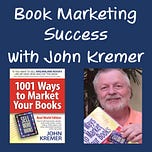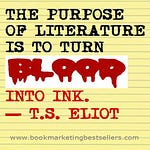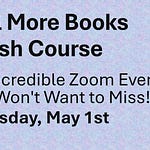Host a Podcast and Be a Podcast Guest!
John Kremer: Every author should have a podcast. I still believe that. I've been promoting it for a long, long time.
I still really believe that because I think podcasting is one of the most powerful tools you have for getting the word out about yourself.
The neat thing in today's world, it's easy to create a combined audio-video podcast that you can syndicate on 40 or 50 platforms.
Judith Briles: How many people come in and start a podcast with absolutely amazing intentions? Kind of like when people are going to do a blog and then within six months the blog is dead. Is there any stats on the startup for podcasts that start petering out?
John Kremer: I don't know of any specific stats, but I do know from my own anecdotal experience that probably 80 or 90% of podcasters give up on their podcasts within six months. It becomes too much work. It's too hard. It's every week.
But the thing is, you don't always have to do a podcast that's going to be a forever podcast. You could do a limited edition 10-episode podcast.
Some of the most popular podcasts in the world are limited podcasts. They cover a true crime case, and then once you're done covering it, the podcast is done. But the podcast lives on in all the podcast syndication sites. It lives on in Audible. It lives on in Amazon. It lives on in lots of places.
Judith Briles: Some of the news shows I'll pick up once in a while, they have both the ongoing, like in perpetuity, like ours has been, and we're seven years old now. But they also have limited edition episodes, almost like a serial book and then it's over. And then maybe they'll come back again when they have a new serial to start up.
John Kremer: Even a limited podcast series still gives you the benefits of a podcast, especially the power of syndication.
One of the incredibly powerful things about podcasts is that it puts you on 30, 40, or even 50 of the major websites on the Internet, including Apple, Amazon, Audible, Google Play, Spotify, Pandora, and more!
You know the power of a podcast because you built up a listenership for your podcast, and you've had millions and millions of listens and possibly views because I know you also put it up on YouTube.
Podcasts not only allow you to syndicate it to all these powerful websites, but it also gives you the opportunity to exchange views and podcast episodes with other podcasters.
Ask key influencers and authors this question: I'd love to interview you for my podcast, but I would really like it if you would also interview me for your podcast. I think we have complimentary audiences that would like to hear both of us talk on each other's podcasts.
The Book of the Month Club
John Kremer: I'm going to talk about the Book of the Month Club. Now, this isn't the old line Book of the Month Club, which died a sad death.
Judith Briles: So, how do we create our own Book of the Month Club?
John Kremer: I met somebody once at one of your seminars, and I'm still trying to track down his name now because I seem to have misplaced it in my move to Arizona.
But he offered a book of the month club. He was a business speaker and consultant to corporations. What he did is he wrote 12 short books. I'm talking about short books, 96 to 128 pages, somewhere in there.
Then whenever he'd go out and speak or whenever he attended a convention, whenever he met somebody that might be a potential client or customer or speaking agent, he added them to his book of the month club.
Once a month, he mailed out real books to his prospect list, a list of about 500 potential customers. He kept adding people to the list as he spoke in different venues and met people on planes, in hotels, or at convention sites.
His book of the month bluc not only justified him printing hundreds or thousands of copies of his books but it also impacted his speaking engagements and his corporate consultations.
From a business standpoint, his book of the month club made perfect sense for him because he picked up all kinds of coaching clients, speaking engagements, and corporate programs that he would do.
To be successful with such a club, first you have to write 12 books. And you can't produce junk. You have to produce real content worth reading, something that would showcase your experience and help to sell people on other products and services you have to offer.
The neat thing is that at the end of every book, of course, he included a pitch for his coaching and his speaking and his corporate programs.
His book of the month club was designed for a business audience. But the thing is, novelists, memoir writers, cookbook authors, and other writers could release five to 10 pages per week instead of releasing a book a month.
One chapter per month, a recipe per week, something like that. They could email it out. Or they could podcast out episodes. They could even do YouTube videos.
I just ran across an old friend of mine, Peggy Glenn, who's now doing videos under the name Grandma Potty Mouth where she shares fun recipes. She's a little spicy in her videos. They're entertaining and fun. She obviously enjoys it. And she actually got a book deal with a New York publisher to publish a cookbook.
It wouldn't be that hard for any author, regardless of what kind of book they're writing, to offer a book of the month club or pages per week club or something like that.
As you share, be sure to collect listener email address so you can email out the episodes or posts or videos to your list.
It means that you don't have to invent new content for your email every week. You can simply be podcasting a book. Or email out a book a few pages at a time.
The classic case of this is the novel, The Martian, which the author originally released as a series of blog posts. The story became so popular that Andy Weir ended up self-publishing his book before he got a contract offer from a major publisher to publish the book. Of course, it got made into a movie. He ended up making millions of dollars on what began as a simple blog.
Judith Briles: Many authors sell their ebooks on Amazon, but they don't go any further.
John Kremer: The neat thing is now with Amazon Kindle, you can do a paperback and a hardcover as well. And they actually encourage you to do those now. And an audio, an AI-generated audio that's actually not bad.
Give Away Your Book
Judith Briles: Yeah, it really can make a powerful difference to have different versions of your book.
Authors are too often afraid to give away their book. I really think it's important to get rid of that mindset because I think in some ways giving away pieces of your book.
John Kremer: For novelists, I recommend giving away your first book because I know you got three more books in you. I don't know any novelist other than Harper Lee and Margaret Mitchell that don't have a dozen novels in their heart and soul.
One of the best ways to market the second novel is to give the first novel away.
Offer the 1st Book in a Series to Sell the 2nd Book
Judith Briles: Here's a little trick I found when I've been in bookstores. I have a historical fantasy fiction book called The Secret Journey. Book two is The Secret Hamlet and book three, The Secret Rise.
When people meet you for the first time, they usually want to start with book one. If they like it, they'll come back to the trough. I typically tell a bookstore to order 20 to 25 copies of my book. I’ve learned to ask booksellers to order 20 to 25 of the 1st novel in a series and a dozen of the 2nd novel.
In one instance, I asked readers, “How would you like to read book one for free if you buy book two?” That got their attention.
So I said, “Do you ever read e-books? Are you on Amazon's Kindle? Let me sign book two for you and you can go up on Kindle Unlimited and download book one for free.” Within five minutes, I sold another five books of book two.
Reach Out to Influencers
John Kremer: The first step to marketing your books is to reach out to influencers in your topic area.
Judith Briles:; How do we find the influencers?
John Kremer: It should be easy for you to find influencers in your topic area. If you don't know who they are, you're probably not writing on the right topic— because you should be a fan of that topic if you're writing in it.
For example, I think it's terrible to write science fiction if you've never read science fiction. It's terrible to write a business book if you don't read business books.
That's a crucial element in researching your audience, researching your topic, and making your book 10 times better.
Work with Your Competitors
Judith Briles: Many times I talk with authors and I ask them, who are their competitors? One author told me, “Well, I don't have any competitors.”
I said, what BS? She just looked at me startled.
That is total BS. We all have competitors. Ask yourself, what are the names of authors who are comparable to what you write? Or, who is competing for your services? Who is competing for your wisdom? Who's out there trying to get people to buy their books that have storylines in your genre? Those are your competitors.
So I don't actually call them competitors. I call them friends or potential friends. And they can become friends, right?
John Kremer: Back when I started out, Dan Poynter had written The Self-Publishing Manual. We partnered together, and he sold thousands of copies of my 1001 Ways to Market Your Books. And I sold thousands of copies of his self-publishing manual. I did the same for Tom and Marilyn Ross with their Complete Guide to Self-Publishing.
I didn't see them as competitors at all. I saw them as people who were offering great content, and I could sell their content. So one of the first things you should do is ask your competitors is: “Can I sell your books?”
Via the Amazon affiliate program, you can easily sell competitor or compatible books.
You can also publish a catalog that you send out to customers when they order your books direct from you. That's how I created my first catalog. If you create a catalog to send out to customers who order your book direct from you, you can generate lots of extra orders. With my catalog, I ended up selling thousands of other authors' books that I stocked in-house.
Potential competitors should be cooperating with each other. One of the best things that writers can do is work together with other people writing similar books to reach out to their audiences and expand each author's audience.
The Audience as Super Fans
Judith Briles: You're talking about the audience as super fans. Who are these unique animals out there? Number one, they're mostly women, but they devour anything in the genre because they're always on the prowl looking for new things. So, why not create a cooperative collective of other authors like you?
Or you can create a collection of related author books on Amazon and collect referral fees for encouraging such sales.
Earlier when we were talking about the Book-of-the-Month Club, we both said we miss them because they were curating books. And there's still room for curators.
John Kremer: I could see you doing a science fiction podcast that interviews your favorite SF authors and promotes their books. Any author can do that.
When authors tell me that they can't think of anything to podcast about, I'm going, duh. All you have to do is interview people. Just interview your favorite authors.
If you started interviewing a few famous authors, you can also start to become famous by associating and interviewing those celebrated authors. You start to become well-known. Their audience starts to seek you out because they say, wow, this person seems to know what they're talking about.
Back in the day, I would have loved to interview Isaac Asimov or Jerry Pournelle or other science fiction authors. I went to a couple of world science fiction conventions and actually got to sit down with some authors and talk to them. In today’s world you could easily go to the next world science fiction convention and record a whole year's worth of podcasts.
And that’s just the first half hour of the podcast. Listen in for even more great ideas!
Resources
The I-Don’t-Have-Any-Time Hour-a-Day Book Marketing Plan: https://bookmarketingbestsellers.com/the-i-dont-have-any-time-hour-a-day-book-marketing-plan
51 Ways to Help a Book Author You Love: https://bookmarketingbestsellers.com/36-ways-to-help-a-book-author-you-love
The Ultimate Guide to Social Media Hashtags for Book Authors (439 author hashtags): https://bookmarketingbestsellers.com/423-social-media-hashtags-for-book-authors
















Share this post